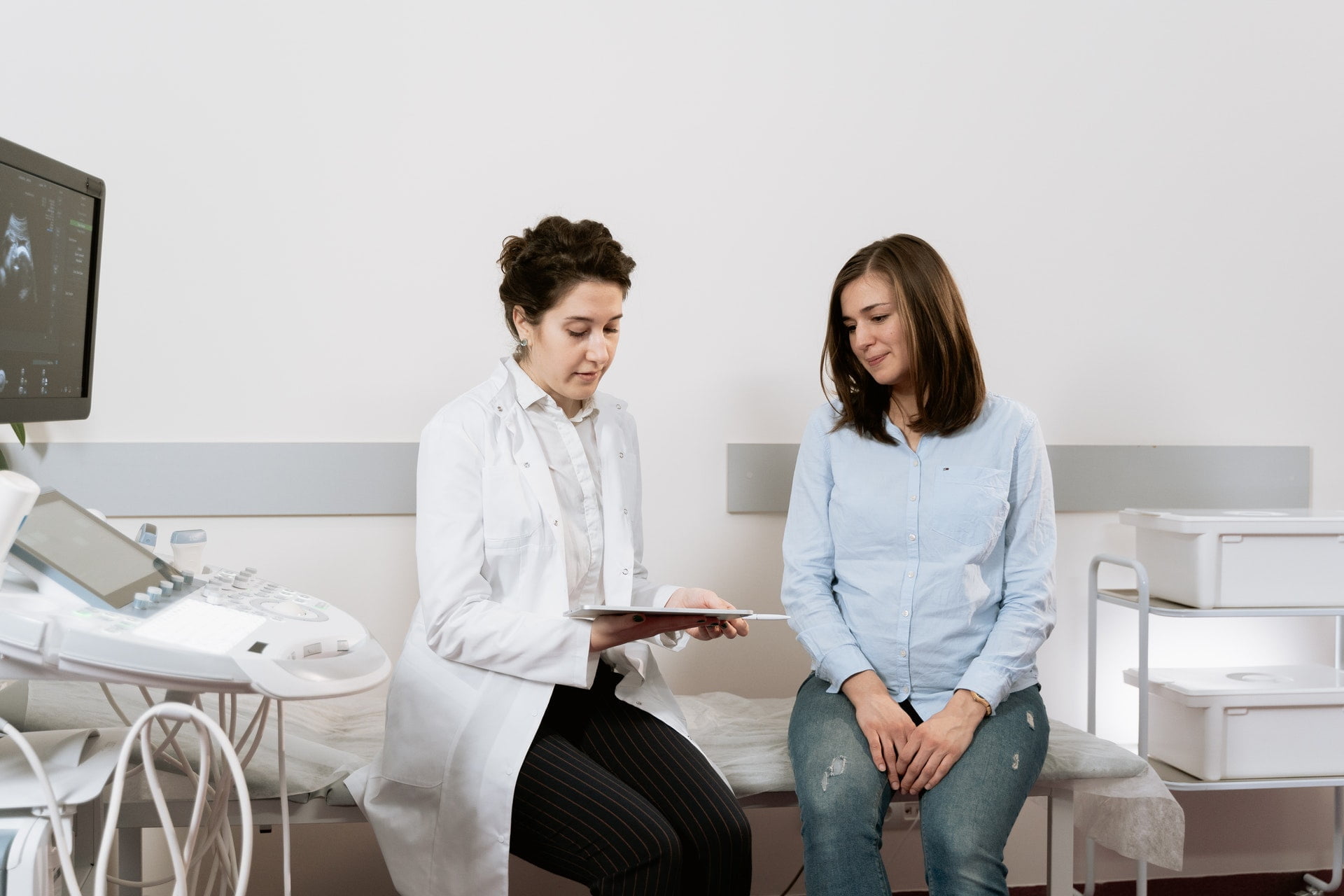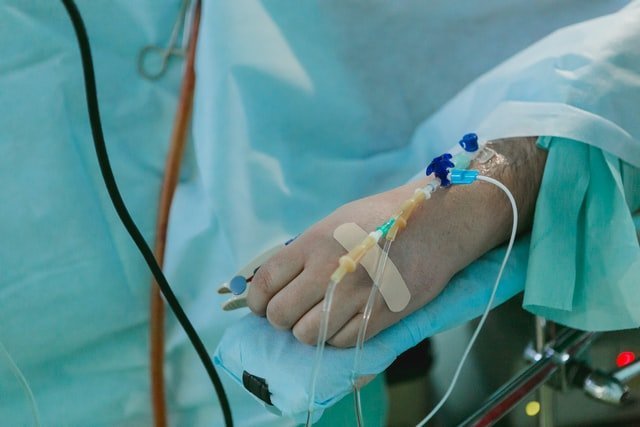Can Alcohol Cause a Urinary Tract Infection?
Quick links for Can Alcohol Cause a Urinary Tract Infection?
- What is a Urinary Tract Infection (UTI)?
- What are the symptoms of a UTI?
- Can alcohol cause a Urinary Tract Infection (UTI)?
- What else can cause a UTI?
- Can I drink alcohol if I have a Urinary Tract Infection (UTI)?
- What other things should I avoid if I have a UTI?
- When should you seek medical advice about a Urinary Tract Infection (UTI)?
- Can I die from a UTI?
- How can I prevent UTIs?
- References for can alcohol cause a Urinary Tract Infection?
While fairly common, a urinary tract infection (UTI) can be painful and uncomfortable.
If you experience them frequently, it is likely that making a few lifestyle changes could reduce your risk of developing another UTI in the future.
Some studies have found a link between drinking alcohol and an increased rate of UTIs. [1]
So, can alcohol cause a urinary tract infection?
What is a Urinary Tract Infection (UTI)?

Doctor taking notes about Urinary Tract Infections (UTIs) and alcohol
Your urinary system is made up of four main areas:
- Kidneys
- Urethra
- Bladder
- Ureters
A urinary tract infection (UTI) is an infection in one of these areas.
It is possible for an infection in one area to spread to another, which is why it’s important to know the signs and seek medical treatment if you believe you have developed a UTI.
Types of UTIs
The type of UTI you will be diagnosed with depends on where the infection is located in your urinary tract.
There are three main types of UTIs which develop in the urethra, kidneys and bladder.
1. Urethritis
This infection is located in the urethra and can cause a burning sensation when you urinate as well as itching and discharge.
2. Pyelonephritis
This infection is located in the kidneys and is often caused by a bladder infection that has spread to your kidneys.
It can cause cloudy and bad-smelling urine as well as back pain.
3. Cystitis
This infection is located in the bladder, where the body stores urine. It can cause a stomach ache, difficulty urinating and a frequent urge to use the bathroom.
A UTI can be painful and annoying, but if it isn’t treated it can lead to serious medical problems.
What are the symptoms of a UTI?

Person suffering from the impact of a Urinary Tract Infection (UTI)
UTIs are most common in women, with 50% of women experiencing one or more UTIs throughout their life.
Around 1 in 10 men will develop a UTI at some point. [2]
A UTI will cause your urinary tract to become inflamed, which is what causes most of the symptoms.
If you are concerned that you may have developed a UTI, make sure to look out for the tell-tale signs. [3]
It’s important to seek treatment as soon as possible, as this can prevent a bladder or urethra infection from spreading to your kidneys.
The common symptoms of a UTI include:
- Frequently feeling the urge to urinate, but little or no urine comes out
- A burning feeling when you urinate
- Feeling extremely tired
- Cloudy or dark urine
- Blood in your urine
- Strange-smelling urine
- Feeling shaky
- Pain in the penis, for men
- Feeling confused
- Nausea and vomiting
- Fever and chills
- Back pain or pain in your lower stomach
- Bed-wetting, in children and older people
Some people have very few symptoms, while others may experience severe side effects.
Young children and older adults are typically most affected by a UTI, but most people of any age and gender will experience some form of discomfort.
Can alcohol cause a Urinary Tract Infection (UTI)?

Medical worker speaking with a patient about a Urinary Tract Infection (UTI)
If you drink alcohol and frequently experience UTIs or simply notice that your bladder feels painful after drinking, you may wonder whether alcohol can cause a UTI.
UTIs are primarily caused by bacteria, so alcohol cannot cause a UTI directly. However, it can make you more prone to developing a UTI or simply make you feel like you have one.
Alcohol can irritate your bladder, making it feel painful or uncomfortable. This happens due to the high acidity levels in alcohol.
Some people mistake this sensation for a UTI.
It is also an extremely dehydrating substance, which can put you at risk of developing a UTI.
Additionally, alcohol can weaken your immune system and leave you more vulnerable to infection if certain bacteria are introduced.
What else can cause a UTI?

Doctor talking to a patient about Urinary Tract Infections (UTIs)
The most common cause of a UTI is when bacteria enter the urinary tract and multiply.
Most UTIs are caused by E. coli bacteria, [4] which live in the bowel.
Women are more likely than men to develop a UTI simply because their urethra is shorter, which makes it easier for bacteria to get inside the bladder.
Bacteria need certain conditions to grow, and factors such as being dehydrated or holding urine in your bladder for too long can create the optimal environment for them to multiply.
Common causes [5] of UTIs include:
- Dehydration
- Not urinating frequently enough
- Sexual intercourse
- Having a catheter inserted
- Certain forms of birth control including spermicide and diaphragms
- Health conditions such as kidney stones
There is no shame in developing a UTI, and it doesn’t mean you are unclean or sexually promiscuous.
Both men and women can develop UTIs, and they are usually treated with a course of antibiotics.
Can I drink alcohol if I have a Urinary Tract Infection (UTI)?

Medical worker researching information about Urinary Tract Infections (UTIs)
As alcohol can worsen the symptoms of a UTI and leave you more vulnerable to serious infection, it is recommended that you avoid alcohol until you have fully recovered.
Additionally, most antibiotics do not react well with alcohol and your doctor will likely advise you to take a break from drinking until a few days after you have completed the course.
Your body will need to focus entirely on clearing the infection during this time.
Drinking alcohol can make the process of recovery more difficult as it weakens your immune system.
If you do choose to continue drinking alcohol when you have a UTI, make sure to drink a glass of water between each alcoholic drink in order to stay hydrated.
Learn more about what to do if you are struggling to cut down on alcohol by visiting Rehab Recovery, a free addiction service helping people to seek help for alcohol addiction and dependency.
What other things should I avoid if I have a UTI?

Addiction support worker speaking to a patient about Urinary Tract Infections (UTIs)
As well as alcohol, other substances and products should be avoided if you are dealing with a UTI.
Caffeine
Caffeinated beverages such as coffee and energy drinks can increase how frequently you urinate, which could lead to dehydration. This can make the symptoms of a UTI worse.
Frequently needing to urinate can also cause some people to hold in their urine, increasing the number of bacteria in your bladder and potentially worsening the UTI.
Illicit drugs
Just like alcohol, illicit drugs such as cocaine and heroin can weaken your immune system and leave you more vulnerable to infection.
Many of them also do not interact well with antibiotics, and you could be putting yourself at risk of overdose or other harmful side effects.

Two women discussing Urinary Tract Infections (UTIs) and alcohol
Sugar and artificial sweeteners
Although you may be tempted to turn to sweet foods such as cake and sweets for comfort during this time, it is best to avoid them.
Sugar and artificial sweeteners have been found to irritate the bladder in some cases, which can make the symptoms of a UTI feel much worse.
Acidic and spicy foods
Anything acidic such as lemons, oranges, pineapple and grapefruit can irritate your bladder and make your symptoms worse.
Additionally, spicy foods such as hot pepper flakes or jalapeños can also irritate the bladder lining and increase the risk of infection.
When should you seek medical advice about a Urinary Tract Infection (UTI)?

Support worker and patient talking about Urinary Tract Infections (UTIs) and alcohol
It’s best to speak to your doctor as soon as you notice the first signs of a UTI.
While some UTIs can go away on their own after a few days, most people need to take a short course of antibiotics to fully recover.
Don’t wait until your symptoms become unbearable – go to your doctor as soon as you suspect you may have a UTI.
Remember, it’s important to take the full course of antibiotics given to you. If you stop them early, a small number of bacteria can remain in your system and flare up again over time.
You should also speak to your doctor if you frequently get UTIs, particularly if you experience them three or more times per year.
You may have an underlying health issue that needs to be treated, such as a bladder abnormality or kidney stones.
Can I die from a UTI?

Person in hospital following a Urinary Tract Infection worsened by alcohol abuse
</
UTIs are extremely common, and most people recover quickly with no serious side effects.In some cases, however, an untreated UTI can lead to urosepsis. This is when the infection has spread further into your body, resulting in a life-threatening response.
Your immune system kicks into overdrive to fight the infection, but in the process it may begin to damage your organs and tissues.
This is known as sepsis, and it can be fatal.
Urosepsis is the most common cause of sepsis, with studies showing that 30% of all sepsis cases start in the urinary tract. [6]
This infection can make you very ill. It can cause organ damage and failure as well as septic shock, which is when your blood pressure falls dangerously low.
Former Bond girl Tanya Roberts passed away from a UTI back in 2021 [7] when the infection spread into her kidneys. As women are more likely to develop a UTI, they are also at higher risk of urosepsis.
While you can die from a UTI, your condition is unlikely to be life-threatening if you seek medical treatment as soon as you notice the symptoms and make sure to follow your doctor’s advice.
How can I prevent UTIs?

Two people holding hands and discussing Urinary Tract Infections (UTIs) and alcohol addiction
It’s great to know what to do if you develop a UTI, but how can you prevent them in the first place?
We’ve put together a list of five simple, low-cost things you can do to lower your risk of developing a UTI.
1. Drink less alcohol
One of the most effective ways to prevent UTIs is to drink less alcohol, particularly if you already drink at or above the recommended limit.
Alcohol can dehydrate you, which puts you at risk of developing a UTI.
It can also irritate your bladder and weaken your immune system, leaving you more vulnerable to infection. [8]
2. Stay hydrated
Drinking enough water is not only good for your overall health, but it can also prevent you from developing a UTI.
Water dilutes your urine and reduces the number of bacteria in your bladder and will also ensure that you are emptying your bladder regularly. It also keeps your bladder tissue healthy.

Man hydrating to avoid a Urinary Tract Infection (UTI)
3. Urinate after sex
Having sex can introduce bacteria into the urethra, which can cause an infection that spreads to the bladder.
To prevent this, make sure to urinate shortly after having sex. This can remove most of the bacteria and reduce your chances of developing an infection.
4. Empty your bladder regularly
Make sure to visit the bathroom as soon as you notice the urge to urinate.
If you don’t empty your bladder regularly, urine can sit there for a long time.
This warm and wet condition is the perfect place for bacteria to thrive, so it’s best to urinate at least four times each day.
5. Take probiotics
Some doctors recommend taking probiotics to keep your urinary tract healthy and free from infection.
Probiotics work by introducing good bacteria to fight the bad bacteria, ensuring a healthy balance.
You may choose to use suppositories or simply take a probiotic supplement on a regular basis.
Get help for alcohol addiction today

Person talking on a phone for help with UTIs and alcohol abuse
If you are struggling to limit your alcohol intake, you may need professional help.
That’s where Rehab Recovery comes in – we are a free service dedicated to helping people recover from addiction.
All you need to do is call us on 0800 088 6686 and we can put you in touch with a rehab clinic suited to your lifestyle, budget and specific needs.
We can also provide a free addiction assessment over the phone as well as general advice and support for anyone struggling with a drug or alcohol addiction.
We know it can be scary to take that first step. Many of our clients have never told anyone about their problems with alcohol, but our friendly team keep everything confidential and will never judge you
In fact, many of us have been in your shoes before.
No matter how severe your addiction is, how small your budget is and how many times you have tried to seek help in the past, we can find the best form of treatment for you.
Surprise yourself and take that first step – it could change your life.
References for Can Alcohol Cause a Urinary Tract Infection?
[1] https://link.springer.com/chapter/10.1007/978-1-4899-1695-2_15
[2] https://www.womenshealth.gov/a-z-topics/urinary-tract-infections
[3] https://www.nhs.uk/conditions/urinary-tract-infections-utis/
[4] https://www.nichd.nih.gov/health/topics/urinary/conditioninfo/causes




